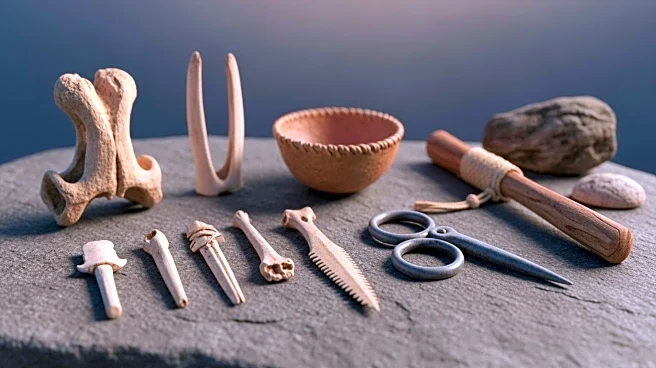What's Happening?
A recent study published in the International Journal of Paleopathology has uncovered evidence that ancient hunter-gatherers in Patagonia provided care for their injured and disabled members. Dr. Victoria Romano and her team analyzed the bones of 189 individuals from the Late Holocene period, revealing that approximately 20% experienced bone trauma ranging from mild to severe. The study categorized injuries into three types: Mild Care, Moderate Care, and Intensive Care, with the majority being mild injuries such as cranial and nasal fractures. Moderate injuries, affecting around 18% of cases, included arm and upper limb fractures, while Intensive Care injuries comprised about 13% and required long-term attention. The findings suggest that these non-sedentary societies had systems in place to support individuals with mobility constraints, indicating a level of social care and cooperation.
Why It's Important?
The study provides significant insights into the social dynamics of ancient hunter-gatherer societies, highlighting their ability to care for injured members despite the challenges of a non-sedentary lifestyle. This research contributes to the understanding of early human social structures and the development of caregiving practices. It suggests that even in prehistoric times, communities recognized the importance of supporting individuals with disabilities, which may have influenced group survival and cohesion. The findings could impact current anthropological theories about the evolution of social care and cooperation, offering a deeper understanding of human societal development.
What's Next?
Future research may focus on population-level studies to explore how caregiving practices evolved over time in different regions. Dr. Romano's team plans to investigate earlier periods in Patagonia to determine if similar care practices existed. Such studies could provide further insights into the social dynamics of ancient societies and how they adapted to environmental and social challenges. Additionally, researchers may look into the implications of these findings for modern caregiving practices, drawing parallels between ancient and contemporary social support systems.
Beyond the Headlines
The study raises ethical and cultural questions about the role of caregiving in human societies. It challenges the notion that early humans were solely focused on survival, suggesting that compassion and social responsibility were integral to their communities. This research may inspire discussions on the cultural significance of caregiving and its impact on societal development, encouraging a reevaluation of how modern societies approach care for the disabled and injured.









